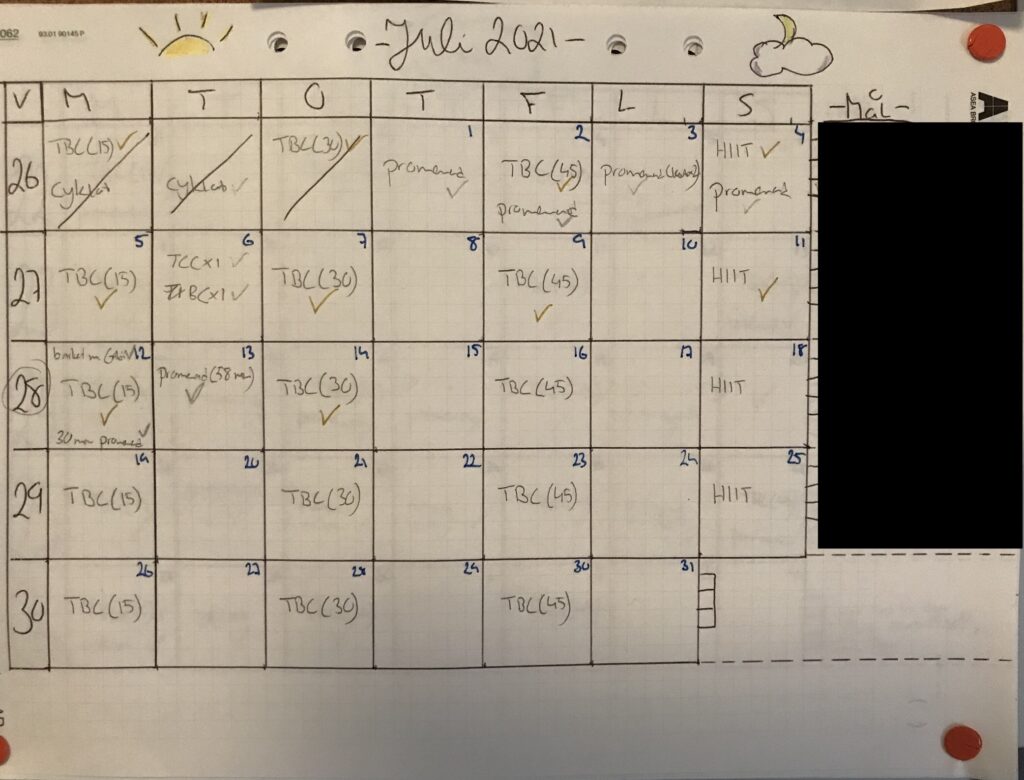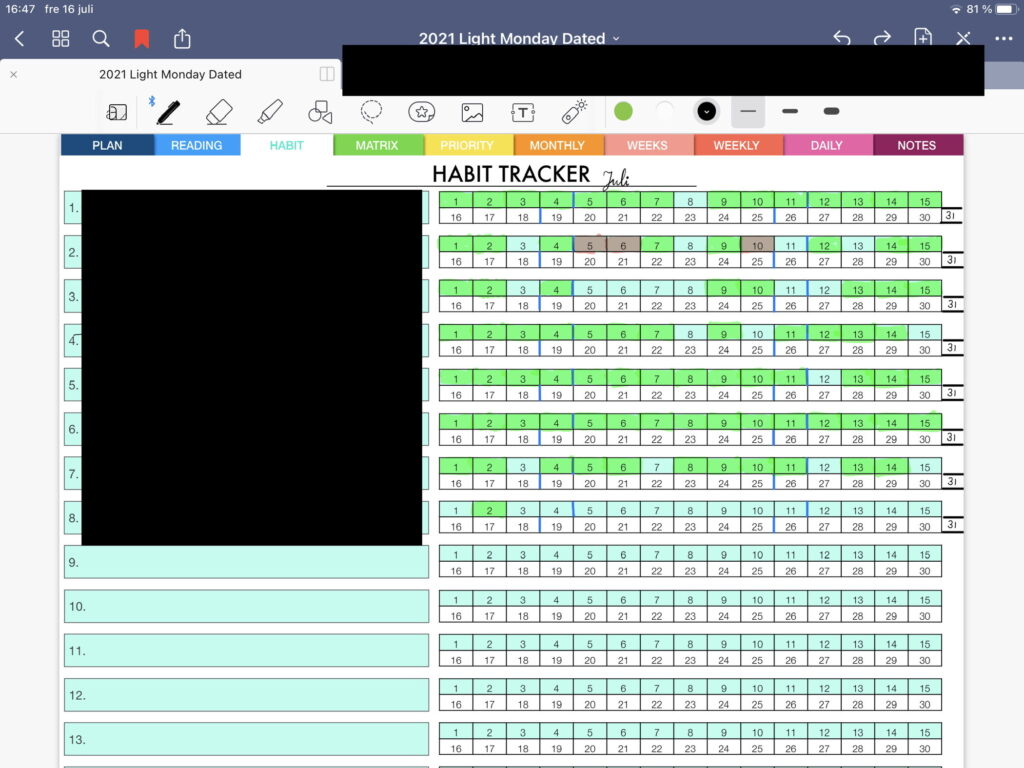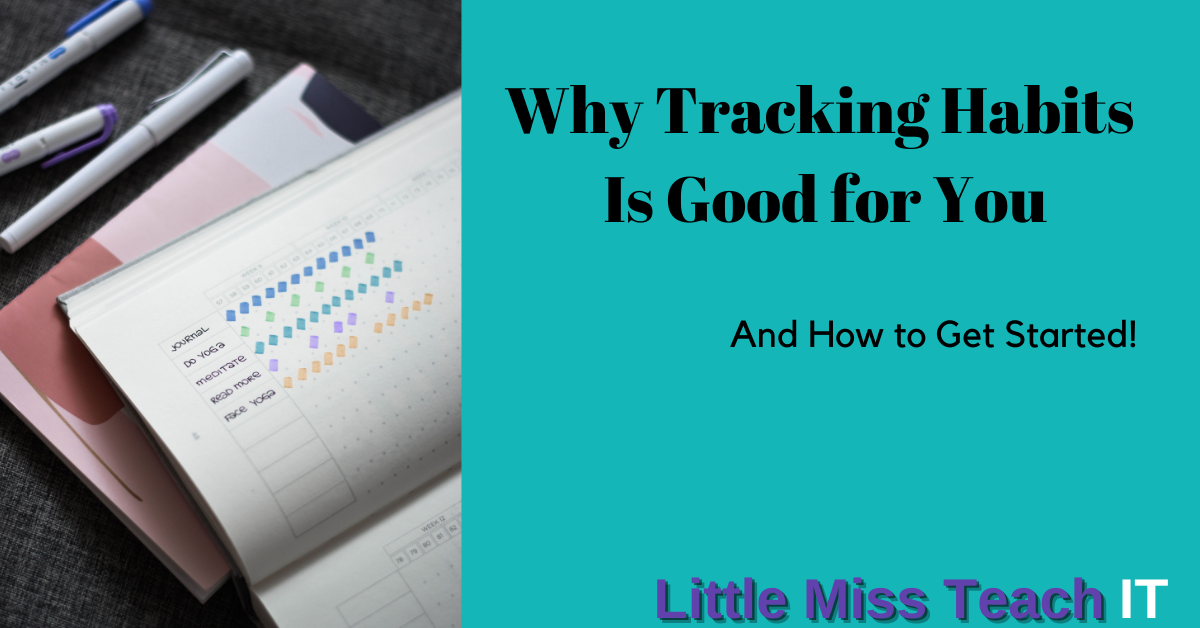Do you know what a habit tracker is? Simply put: it is a way to see things that you do on a regular basis that you may or may not think about. Why should you track your habits? Why is tracking habits good for you? Well, there could be several reasons for you to track your habits:
- See patterns good/bad and see connections
- To motivate yourself
- Make improvement in your life
In order to change something, it’s good to first know where you are right now. Want to create healthy habits? First, take a look at where you are and where you want to go.
Sometimes it can be an idea to track habits to see good or bad patterns you have in your life and make the connections from there. Perhaps you notice that you get too little sleep (guilty as charged!), this can affect your life in several ways so seeing this can help you in deciding on the next step.
Tracking habits could be a simple but effective way to get you closer to the goals you set for yourself. Want to lose weight? Try to track food and water intake for a while.
Want to change career or add more things to your resume? Perhaps taking a course and track your reading habits is a good idea.
How Do You Track Your Habits?
There are several ways to track your habits, and at the end of the day it comes down to personal preference.
If you choose an analog style, then perhaps using a bullet journal style can be something for you? Don’t be put off by the pretty designs you see online if you make a Google search for this or on Instagram! A habit tracker can be something as simple as an x or dot in a column that you have for each day.
How Do You Get Started?
What I do recommend is to try to be consistent about it, easier said than done sometimes I know, but still. If you want to create a new habit, then it won’t be enough to do it just for a day.
To create a new habit, you need to do this for at least three weeks. Before that, you can’t really call it a habit.
An easy way to implement a new habit is to add it to something you already do, rather than just replace something altogether. Sure, sometimes you do need to replace a bad habit with a better one, but even then it’s easier to start small and build upon what you already do.
Perhaps you add this as a part of your evening routine, or add this as a part of your morning where you track habits from the day before? Personally, I’d recommend tracking things at the end of each day. It’s easy to forget if you get to sleep on it, especially if you track your mood for the day.
Create a Habit Loop
By adding a new habit to an existing one, chances are you’ll actually stick to it. Matt Ragland talks about creating habit loops and joining one habit to the next. I believe one example he mentions is that while he brews his coffee, he takes the time to sit down and journal a bit at the start of the day.
It doesn’t take much time, but since he’s done this for a while it becomes a habit and his mindset adjusts so that it’s easier to get in the mood to journal each morning.
This is an interesting concept and I’ve tried something similar this summer. Each morning while my coffee brews I get dressed and make my bed. The last part makes the bedroom look neater and I feel better about coming home to a made bed (and this comes from someone who spent a lot of time avoiding this throughout adolescence and a great part of my adult life).
If you want to track your habits, it’s important to create some time to do this as well. It doesn’t have to take a lot of time, but you still need to take the time to do it.
Can’t I Just Track My Habits Digitally?
Of course you can! And sometimes a combination of tracking digital during the day and summarizing analog at the end of the day/week is what works best for you.
At the moment I do a combination of the two, but I’m more at the digital than the analog side right now. I use an app called Way of Life to make a quick check-in for the habits I choose.
I also sit down every evening and track things in my habit tracker that I have in my digital planner. However, I also have a simple, graded paper where I track my activity.

This is just a hand-drawn calendar where I write in my planned workouts – but it does give me something visual and the satisfaction of making a golden check beside planned workouts and a silver check for unplanned workouts that just happened is very satisfying.

You can use analog tools or digital ones, the choice is up to you. The important thing is to keep in mind WHY you track your habits, and that you don’t let this become another thing you have to do.
How to Track Your Habits
I’ve tracked my habits for a while, so there are some things I’d recommend for you:
- Start small
- Don’t track everything
The reason you should start small is that it’s easy to become overwhelmed. Imagine going from zero workouts to five or more each week. Does that sound reasonable or like something you could keep up in the long run? Perhaps, but for many of us that is a recipe for disaster.
Another tip: don’t track everything! I did this…it wasn’t healthy and it added a lot of stress and little reward. This goes together with starting small: focus on a very limited number of habits you wish to track. Stick with that for a while, then add perhaps one more habit after a while.
A good quote is this one by Ryder Carroll from his book The Bullet Journal Method:
Try to avoid tracking six habits simultaneously. This can quickly become overwhelming, burdensome, and demotivating. It will take a lot of time to maintain, and the probability of failing to form a half dozen new habits at the same time is high. Track only the habits that you feel most strongly about now. Be cool. Be selective.
– Carroll Ryder, The Bullet Journal Method p. 246
Why Start Small?
The point? Keep the focus on WHY you track your habits. It’s not another chore for you, it should bring you closer to your goal or help you see patterns that you wish to change.
It’s not that you can only have a very limited number and stay there forever, it’s just that by starting small you give yourself a higher chance at succeeding. This in turn can motivate you to take on the next habit and so on.
As in the quote above, be selective and start with what feels most urgent right now. Think of why you wish to track this habit. Is it to see a pattern you wish to change or break? Is it to prove to yourself that you can do something that you’ve failed in the past?
A habit tracker is a way to visualize things you do or feel that you should do in your everyday life. Try to give yourself some grace and look at this more as a reporter than a judge – take a look at Mr. Ragland’s WRAP (later renamed to WARP) method for some more insights on this.
Conclusion
There could be several reasons why tracking habits is good for you. Either way, you choose to do this, start small, and don’t beat yourself up if you miss a day. If you do, this will only add stress to your life and it won’t really do you any good.
Creating a new habit takes time, so make sure you give yourself that time! Try to add this new habit to something you already do in a way that makes sense, this could make it easier for you to build up that new thing you want to do.
What good habits do you want to create? Mine is trying to go to bed earlier and get more sleep, let’s just say it’s not going well ????
How are you doing with your habits?
Some Useful Links for You
- Find out more about the Bullet Journal system on Ryder Carrolls webpage or start with this YouTube video where Carroll explains the system.
- An example of a simple, minimalistic habit tracker shown by Matt Ragland.
- If you prefer to listen then take a look at the following podcast episodes:
- Bullet Journal Beginner Setup Tips – how to set up your first bullet journal step by step
- Build Lifelong Habits with Simple Systems – more on habit loops, starting small and why starting out small is the way to go.
- Super Simple Habit Tracker – start tracking your habits, but keep a minimalist approach
